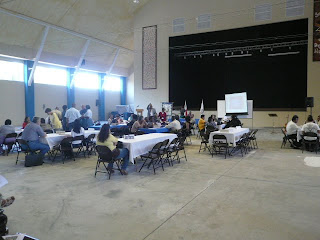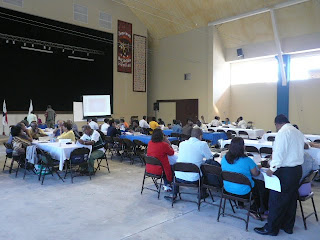 O God, the maker of heaven and earth, you gave your venerable servant, the holy and gentle Polycarp, boldness to confess Jesus Christ as King and Savior, and steadfastness to die for his faith: Give us grace, following his example, to share the cup of Christ and rise to eternal life; through Jesus Christ our Lord, who lives and reigns with you and the Holy Spirit, one God, now and for ever. Amen.
O God, the maker of heaven and earth, you gave your venerable servant, the holy and gentle Polycarp, boldness to confess Jesus Christ as King and Savior, and steadfastness to die for his faith: Give us grace, following his example, to share the cup of Christ and rise to eternal life; through Jesus Christ our Lord, who lives and reigns with you and the Holy Spirit, one God, now and for ever. Amen.Today is the feast of Polycarp, Bishop of Smyrna, and martyr. Smyrna was a city in Asia Minor, in the nation we now call Turkey. Born in the year 69, Polycarp was a student of John the Apostle and Evangelist, studying under him during his time in Ephesus, after his exile on Patmos. Polycarp was one of the bishops actually consecrated in the Apostolic succession since he was ordained by an Apostle. He was a well respected bishop; when Ignatius made his journey to Rome for his own martyrdom, he wrote letters to various churches along the way, and one of the letters was addressed to Polycarp. Polycarp wrote an
Epistle to the Philippians which was read by many early Christian communities, although it was not included in the canon. In this epistle he reminds the Christians in Philippi of the importance of holding on to the promises of God, of the importance of keeping the faith, and that the clergy must be self-disciplined, righteous, humane, and hard working. He was very clear that clergy must not be "in love with money" and live lives of holiness as examples to the flock. He also wrote that it was important to remember that Jesus had two nature, human and divine, in opposition to the Docetists.

The account of Polycarp's martyrdom may have been written by Irenaeus of Lyons, and it is the earliest account of a martyrdom after the story of the deacon Stephen in the Acts of the Apostles. One in the year 155 or 156, a crowd was at the stadium in Smyrna watching the spectacle of several Christians being thrown to the wild beasts. The Christians stood firm and died noble deaths, but the crowd, upset by the martyrs' heroism, broke into cries of "Down with the infidels!" and "Go find Polycarp!" When the bishop learned that the crowd wanted him, he was all for staying in the city and facing the music, but members of his church took him out of town and to a hiding place in the hills. He spent his entire time there, day and night, praying for those who were being persecuted. One day while praying, he had a vision in which his pillow ignited and burned to ashes. He went down stairs and told his companions, "I seems that I will be burnt alive." They kept moving him from one farm to another with the authorities hot on their heels. Soldiers arrested two servant boys at one location, and, under torture, they told the police where Polycarp was. When the police appeared at the farm, Polycarp surrendered rather than continue on the run. He asked the police for just a little time to pray, and, seeing that he was rather elderly and not much of a threat, they agreed. He prayed so full of God's grace that two whole hours passed before he could stop praying. Several of the police began to feel some remorse for having to arrest such a saintly old man. Polycarp was brought to the Police Commissioner, who took him into his carriage and said, "Come on, what's the harm in offering some incense and saying 'Caesar is Lord?' It will save your life!" Polycarp said, "No, I won't take your advice." Many people tried to convince him to offer incense to the honor of the Emperor but he would not budge. They finally arrived at the stadium, where the crowd was waiting for the day's entertainment and all worked up. When he walked into the stadium, a voice from the heavens said "Be strong, Polycarp, and play the man." Standing in front of the crowd, the police gave him one more chance to recant, saying, "Think of your years. Swear by the luck of the Emperor, or at least say 'Down with the infidels.'" The Governor finally said, "Take an oath and I'll let you go. Revile your Christ." Polycarp said, "I've served Him for 86 years and he had done me no wrong. How can I blaspheme and deny my King and Savior?" They threatened him with wild beasts, and he said, "Bring on the animals, because I will not trade a good way of thinking for a bad one. It might be a good idea for you, however, to switch from the wrong to the right!" Like most men in power, the Police Commissioner didn't appreciate smart-aleck answers, and he hollered "I'll have you burned with fire since you think so lightly of the beasts!" Polycarp responded "The fire you threaten me with won't burn for very long; it will eventually go out, but are you unaware of the eternal flames of judgment and eternal torment that wait for the ungodly? Come on, stop wasting time, do what ever yo are going to do!" The crowd shouted, "Polycarp has admitted to being a Christian!" (Duh! Ever notice how intelligent large crowds in stadiums are?) and started gathering wood to burn Polycarp. When the pile of combustible materials was ready, Polycarp took off his tunic and sandals and stood next to the stake. They fastened his feet with irons and were about to nail him to the stake when he said, "Let me be; He who gives me strength to endure the flames will give me strength not to flinch at the stake without your making sure of it with nails." So they tied him to the stake, instead. Polycarp looked up into heaven and prayed: "Almighty God and Father of our Lord, Jesus Christ, you are the God of angels and power and of the whole creation, and all the generations of the righteous live in your sight. I thank you for granting me this day and hour that I might be numbered amongst the martyrs, to share the cup of your Anointed and to rise into life everlasting. May I be received this day into your presence, a sacrifice rich and acceptable, for you are the God of truth and in you is no falsehood. I praise you, I glorify you, and I bless you, through our eternal high priest in heaven, your believed Son, Jesus, Christ, by whom and with whom be glory to you and the Holy spirit, now and for all ages to come. Amen." As the "amen" soared up and the prayer ended, the men lit the fire and a great sheet of flame blazed out. It enveloped Polycarp like a ship's sail and formed a wall around him, and he was in the center of the fire, like an ingot of gold being refined in the furnace. Then everyone smelled a wonderful fragrance, not the odor of burning flesh, but of fine incense. Finally, when they realized the fire would not destroy him, two tough-guys went up and stabbed him. As they did, a dove flew out of the fire and there was such a rush of blood that the flames were extinguished! And with that, the great Bishop of Smyrna, Polycarp, student of the Beloved Disciple, went to his reward, to a robe of white, standing with a palm branch in front of the throne of the Lamb, saying "Salvation belongs to our God who is seated on the throne, and to the Lamb."
Tertullian said, "The blood of the martyrs is the seed of the Church." The witness of brave Christians like Polycarp has been an example to Christians for centuries. When I read of Christians in the U.S. claim that they are being persecuted because their children can't pray around a flag pole at school, or those in TEC who claim persecution because gay and lesbian Christians are being ordained, I think of someone like Polycarp, someone who knew real persecution, someone who stood up to the authorities, someone who braved the wild beasts and burning at the stake, and I think, "aren't we blessed that we don't know real persecution?" May Polycarp's witness be a model for us all.
































































































